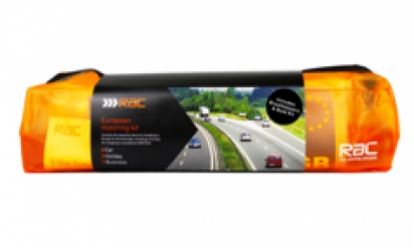In December 2020, the EU and UK came to an agreement on a post-Brexit trade deal.
To help our members, we have provided an overview of what is needed to drive in EU or EEA countries.
Read our driving in Europe guide to learn more.
European Breakdown Cover
The RAC continues to provide breakdown cover through our partners operating within the European Union, either on an annual basis or just for a single trip. We provide breakdown cover for almost every country in Europe, such as France, Spain, Germany, Italy and Ireland. You can compare our European breakdown cover with providers such as the AA and Greenflag.
It is vital that you also have the correct documentation with you following the UK leaving the EU.
- Temporary car insurance - from one hour to 30 days
- Need cover for the UK leg of your trip? Get complete peace of mind at home or at the roadside with RAC breakdown cover
- Electric car breakdown cover

Instant cover available
• 24/7 rescue at the roadside
• Help to get home if your vehicle can't be fixed
• 5 star Defaqto rated cover
*T&Cs apply.

Passport validity
For travel to Europe, UK passports should:
- have at least 6 months validity left
- and, be less than 10 years old
UK passport holders should check its validity using the Government’s online passport checker.
If required, apply for a new passport in good time – it may take up to 10 weeks to renew online. It may take longer for a first adult passport.
Burgundy passports, whether with “European Union” on the cover or not, remain valid alongside the new blue passport.
International Driving Permits
If you have a photocard driving licence, an International Driving Permit (IDP) will not be required for short visits to the EU, Switzerland, Norway, Iceland or Liechtenstein. However, there are some exceptions.
For example, people who only have a paper licence, not a photocard one should purchase an IDP. Those that have licences issued in Gibraltar, Guernsey, Jersey or the Isle of Man may also need an IDP.
It is important to ensure you have the right IDP for the EU country you are travelling in - the GOV.UK website has the most-up-to-date information.
Read our guide to IDPs for more information.
Green Card insurance
From 2nd August 2021, motorists no longer require an insurance green card to drive their vehicles in the EU (including Ireland). The same applies in Andorra, Bosnia and Herzegovina, Iceland, Liechtenstein, Norway, Serbia, and Switzerland.
You may need to carry a green card in some other countries, which you can find here.
Green Cards are an international certificate of insurance issued by insurance providers in the UK, guaranteeing that the motorist has the necessary third-party motor insurance cover for travel in the country being travelled to. The UK Government advises that you can now print green cards yourself. They no longer need to be printed on green paper.
Motorists should contact their vehicle insurers to obtain a green card both for their car and, if they are towing, for their trailer or caravan as well. There may be an administrative cost involved.
As of December 2020, the UK Government advises that if you need a physical copy of a green card, you will need to contact your car insurance provider at least six weeks before you travel.
You may need to show green cards at police checks and at the border when entering the EEA or moving between EEA countries. This is likely to depend on the authorities at the border of each country.
Keep up to date here.
GB stickers post-Brexit
From 28th September 2021, the distinguishing mark (or national identifier) displayed on vehicles registered in the United Kingdom that are driven abroad has changed from GB to UK.
This means that vehicles registered in the UK must display the letters 'UK' when driven in the EU.
The identifier can be incorporated in vehicle number plates (along with the Union Flag) or as a separate sticker. Note that vehicles featuring the letters GB together with the Council of Europe golden stars are no longer valid for driving abroad.
If your vehicle does not have the UK identifier within the number plate, you will require a UK sticker. GB stickers will no longer be valid from the end of September.
Taking your pets abroad

Pet passports issued in Great Britain are no longer valid for travel to the EU or Northern Ireland. You’ll need a pet passport issued in an EU country or Northern Ireland, instead.
Before your dog, cat or ferret can travel to the EU or Northern Ireland, you’ll need an animal health certificate (AHC) instead of a pet passport. Government guidance states:
- You must have your dog, cat or ferret microchipped.
- Vaccinate your dog, cat or ferret against rabies – your pet must be at least 12 weeks old before it can be vaccinated.
- Wait 21 days after the primary vaccination before travel.
- Visit your vet to get an AHC for your pet around a month before your travels and no more than 10 days before travel to the EU.
Further guidance on the process can be found here.
UK nationals living in Europe
If you live and drive in the EU or in an EEA country, Government guidance says you should consider exchanging your UK driving licence for a local one.
The deadline for this depends on which country you live in. The Government’s advice lays out the situation depending on which country you live in.
Road traffic accidents in Europe
In the event of a road traffic accident in an EU country you should in the first instance contact your insurer.
In the event of an accident in an EU or EEA country caused by an uninsured or an untraced driver, UK residents may not receive compensation. Contact your insurer for more information.
This scenario could differ depending on the country.
Taking food and plants into the EU
Be aware that you cannot take the following with you into the EU:
- meat or products containing meat
- milk or dairy products
You cannot take the following into the EU unless you pay to have them inspected before you leave and get a ‘phytosanitary certificate’:
- fresh fruit (apart from bananas, coconuts, dates, pineapples and durians)
- vegetables
- plants
- plant products
Vehicle registration documents
If you are taking your vehicle to the EU for less than 12 months, you should carry one of the following documents with you:
- your vehicle log book (V5C), if you have one
- a VE103 to show you’re allowed to use your hired or leased vehicle abroad
Vehicle on Hire Certificate
UK motorists travelling abroad in a UK registered vehicle must carry its original Vehicle Registration Document (VRD). If your vehicle is hired or leased, the hire/lease company will not usually release the original VRD. The Vehicle on Hire Certificate is the normal alternative, which can be carried by the driver in lieu of the original VRD.
To find out more information including how to get a Vehicle on Hire Certificate, read our guide.
Please note that this advice is correct as of June 2025.
Driving in France Kit from £25.99
Did you know you could be fined up to €530 for not carrying the right kit with you in France?


Driving in the EU post-Brexit FAQ
- Can I drive my car in Europe after Brexit?
Yes, you can still drive your vehicle in mainland Europe following Brexit - however, you will need to have a ‘UK’ sticker clearly positioned on the rear of your vehicle.
- Will my EU driving licence be valid after Brexit?
According to the UK Government, ‘EU licence-holders living in the UK can continue to use their licence if it is valid, subject to UK licence renewal requirements. This means an EU licence must be changed to a UK licence at the age of 70, or three years after the driver becomes resident, whichever is later’.
- Will my car insurance be valid in Europe after Brexit?
Yes, your car insurance will most likely be valid in Europe after Brexit. Speak to your insurance provider to clarify.










